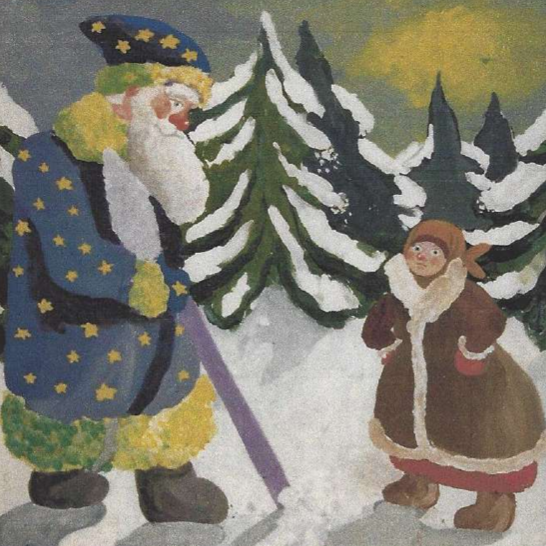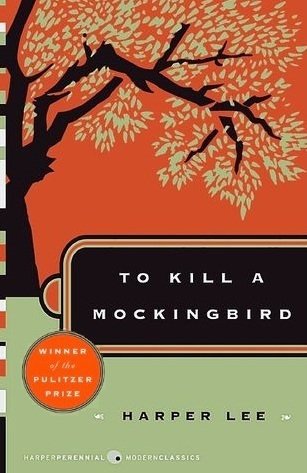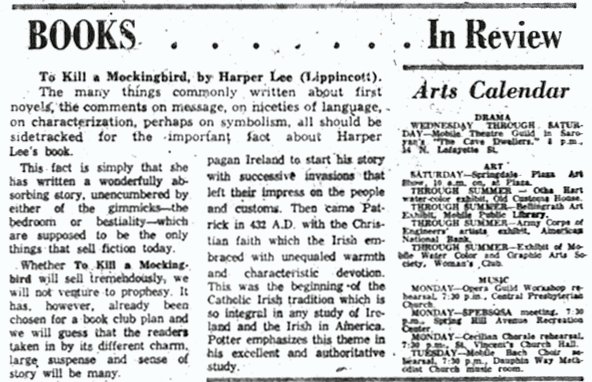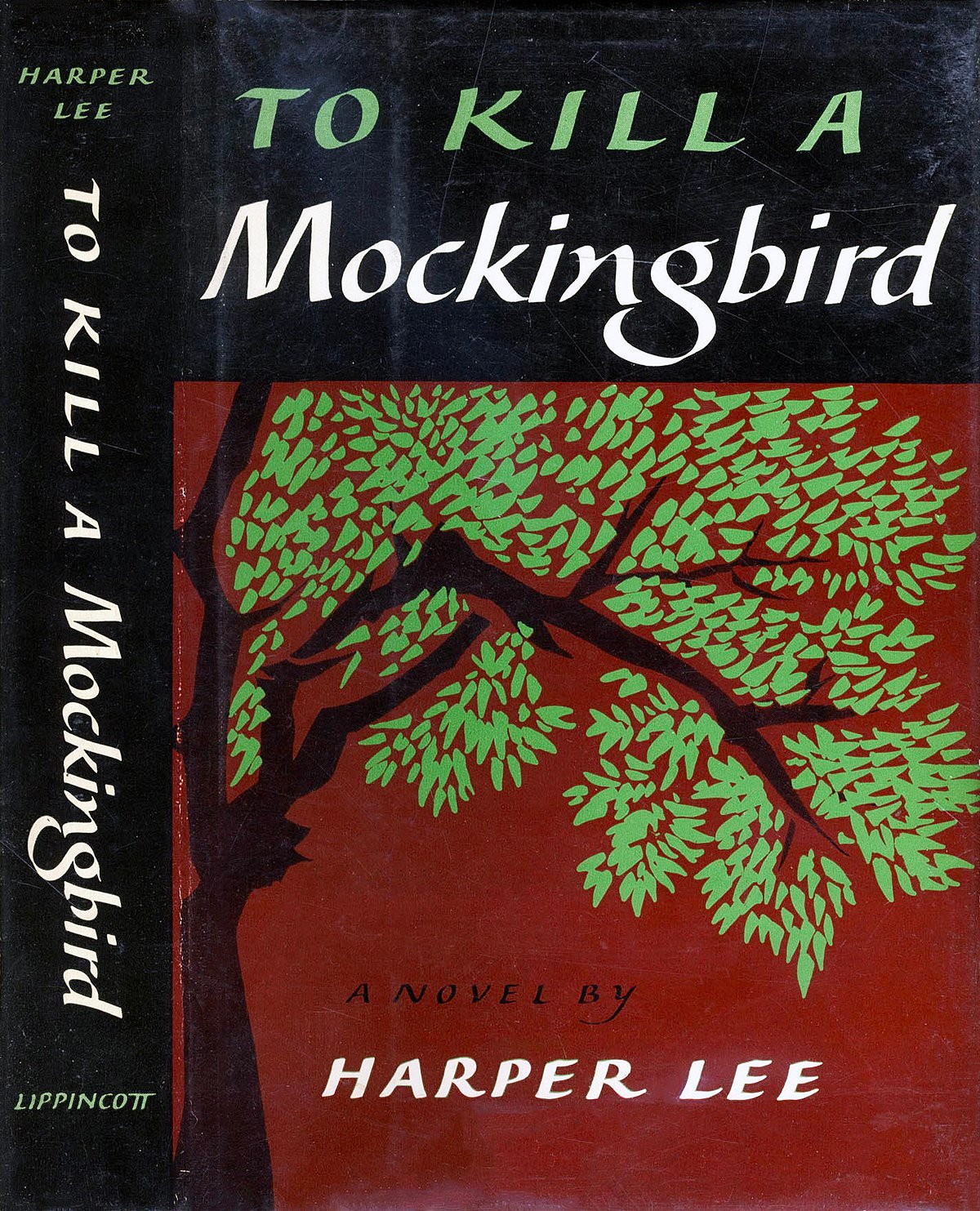Part One
Harper Lee’s To Kill a Mockingbird depicts the life of its young narrator, Jean Louise “Scout” Finch, in the small town of Maycomb, Alabama, in the mid-1930s. Scout opens the novel as a grown woman reflecting back on key events in her childhood. The novel covers a two-year period, beginning when Scout is six and ending when she is eight.
Scout lives with her father, Atticus, a widowed lawyer, and her older brother, Jem (short for Jeremy). Their black housekeeper, Calpurnia, tends to the children. Scout and Jem’s summer playmate, Dill Harris, shares the Finch children’s adventures and adds imagination and intrigue to their game playing. In the novel, we see Scout grow in awareness and come to new understandings about her town, her family, and herself.
During the summer before Scout enters school, the children become fascinated with Arthur “Boo” Radley, a reclusive neighbor. Radley’s father, a religious fanatic, confined Boo to the house because he was arrested for youthful pranks as a teenager. Some years later, Boo casually stabbed his father in the leg with a pair of scissors, confirming people’s worst fears about him. The children are naturally afraid of and intrigued by such a “malevolent phantom,” as Scout calls him. Yet they only approach the house once, when Jem runs and touches the porch on a dare.
Scout enters first grade the following September and must confront new challenges and learn new ways to deal with people. She cannot understand, for instance, her young teacher’s lack of familiarity with the town families and their peculiarities; one was the Cunningham children’s poverty and pride. Later, Atticus explains to Scout that she must put herself in others’ places before judging them, one of the many lessons she learns by making mistakes.
With summer’s return, Dill arrives and the children’s absorption with Boo Radley begins again in earnest. Ultimately, they attempt to look in the house to see Boo, but a shotgun blast from Nathan Radley, Boo’s brother, drives them off. In their panic, Jem catches his overalls in the Radley fence and must abandon them. Later that night, he returns to retrieve them. He finds them neatly folded on the fence with the ripped fabric poorly resewn.
Their contact with Boo Radley continues into the school year. Before the previous summer, Scout and Jem had discovered gum and Indian head pennies in a knot-holed tree by the Radley house. Now more objects begin to appear in the knothole, including replicas of Scout and Jem carved in soap. They decide to leave a note for whoever is leaving the objects; but before they can, Nathan Radley fills the hole with cement, upsetting Jem.
Scout soon encounters trouble at school when a schoolmate condemns Atticus for “defending n*ggers”. Atticus confirms that he is defending a black man named Tom Robinson. Tom was accused of raping a white woman, and that his conscience compels him to do no less. He warns her that she will encounter more accusations of this kind and to remember that despite their views, the people who cast slurs at them are still their friends. Atticus later tells his brother Jack that he hopes he can guide his children through this time without them becoming bitter and “without catching Maycomb’s usual disease” of racism.
That Christmas, Atticus gives the children airrifles and admonishes them to shoot no mockingbirds. Miss Maudie Atkinson, their neighbor, explains Atticus’s reasons when she says that “Mockingbirds don’t do one thing but make music for us to enjoy.” Hence, it is a sin to kill them.
At this time, the children feel disappointed in Atticus because he is old (almost fifty) and does nothing of interest. They soon learn, however, about one of their father’s unique talents when he shoots a rabid dog that threatens the neighborhood, killing the beast with one shot. The neighbors tell them that Atticus is the best shot in the county, he just chooses not to shoot a gun unless he must. Scout admires Atticus for his shooting talent, but Jem admires him for his gentlemanly restraint.
Part Two
The family’s involvement in Tom Robinson’s trial dominates Part Two of the novel. One personal inconvenience of the trial is the arrival of Aunt Alexandra, Atticus’s sister, who comes to tend to the family. Scout finds her presence unwelcome because Aunt Alexandra disapproves of her tomboyish dress and activities and tries to make Scout wear dresses and attend women’s socials.
The time for the trial arrives, and Atticus guards the jail door the night Tom Robinson is brought to Maycomb. The children, including Dill, sneak out to watch over him and soon become involved in a standoff. Carloads of men drive up and demand that Atticus let them have Tom Robinson, and he gently refuses. Scout recognizes a schoolmate’s father, Mr. Cunningham, and asks him polite questions about his legal debt to Atticus, who did work for him, and about his son. Scout’s innocent questioning of Mr. Cunningham shames him, and he convinces the men to leave.
The children also sneak to the courthouse to attend the trial. They sit in the balcony with the black townspeople because no seats are available on the ground floor. Atticus’s questioning of Bob Ewell and Mayella Ewell, both of whom claim Tom Robinson beat and raped Mayella, reveals their lies. Mayella was beaten primarily on the right side of her body by a left-handed man. By having Bob Ewell sign his name, Atticus shows him to be left-handed. Tom Robinson’s left arm, however, is crippled from a boyhood accident.
Tom’s story rings truer. He contends that Mayella invited him into the house and tried to seduce him, a story made credible by Mayella’s and Tom’s descriptions of her lonely life. Tom resisted her advances, but before he could leave Bob Ewell discovered them. Tom ran and Ewell beat Mayella. To avoid social disgrace, the Ewells claimed Tom had raped her.
Despite the evidence, Tom is convicted. Atticus has expected this verdict and believes he can win on appeal. Jem has difficulty accepting the injustice of the verdict. Others, however, remain angry over Atticus’s sincere defense of Robinson, particularly Bob Ewell. Ewell confronts Atticus, threatens him, and spits on him. Soon after, Tom Robinson’s story ends in tragedy as he is shot trying to escape from prison. He ran because he believed he could find no justice in a whitedominated legal system.
The following October, Scout dresses as a ham for the school Halloween pageant. On the way home from the pageant, she and Jem are followed, then attacked. Scout cannot see their assailant because of her costume, but she hears Jem grappling with him and hears Jem being injured.
After the confused struggle, she feels a man lying on the ground and sees another man carrying Jem. She follows them home. The doctor arrives and assures her that Jem is alive and has suffered only a broken arm. The man who carried him home is standing in Jem’s room. To Scout’s tearful amazement, she realizes that he is Boo Radley. Sheriff Heck Tate informs them that Bob Ewell attacked them and that only Scout’s costume saved her.
Ewell himself now lies dead, stabbed in the ribs. Atticus believes Jem killed Ewell in self-defense, but Tate makes him realize that Boo Radley actually stabbed Ewell and saved both children’s lives. The men agree to claim that Ewell fell on his knife in order to save Boo the spectacle of a trial. Scout walks Boo home:
He had to stoop a little to accommodate me, but if Miss Stephanie Crawford was watching from her upstairs window, she would see Arthur Radley escorting me down the sidewalk, as any gentleman would do.
We came to the street light on the corner, and I wondered how many times Dill had stood there hugging the fat pole, watching, waiting, hoping. I wondered how many times Jem and I had made this journey, but I entered the Radley front gate for the second time in my life. Boo and I walked up the steps to the porch. His fingers found the front doorknob. He gently released my hand, opened the door, went inside, and shut the door behind him. I never saw him again.
Neighbors bring food with death and flowers with sickness and little things in between. Boo was our neighbor. He gave us two soap dolls, a broken watch and chain, a pair of good-luck pennies, and our lives. But neighbors give in return. We never put back into the tree what we took out of it; we had given him nothing, and it made me sad.
She returns home to Atticus, who stays up all night waiting for Jem to awake.



